
19 minute read
Q&A with Liam Cullen
Age: 21 Position: Attacker Nationality: Welsh
WHILE 2020 HAS BEEN AS CHALLENGING A YEAR AS ANYONE COULD EVER HAVE IMAGINED FACING, IT HAS HAD ITS BRIGHT SPOTS TO LIFT THE GLOOM OF LIFE AMIDST A GLOBAL PANDEMIC. TAKE THE CASE OF LIAM CULLEN, WHO ACHIEVED THE CAREER MILESTONES OF HIS FIRST SWANSEA CITY GOAL – AND WHAT A GOAL IT WAS – AS WELL AS HIS FIRST START FOR HIS BOYHOOD CLUB. HERE, HE TALKS ABOUT HIS JOURNEY FROM SUPPORTER AND MASCOT TO FIRST-TEAM PLAYER, WHY HE SPENDS HIS OFF-SEASON WORKING BEHIND A BAR AND MOWING CRICKET FIELDS, AND HOW PULLING ON A SWANSEA SHIRT HAS ALWAYS BEEN SERIOUS BUSINESS SINCE HE FIRST JOINED THE CLUB AT THE AGE OF EIGHT.
Advertisement
Liam, as we sit down now, you’ve just made your first start for Swansea City against Rotherham. How do you reflect on it after a few days?
It’s pretty much a lifetime’s work for days like that. To do it at my boyhood club - the club I’ve grown up supporting all my life - is a dream come true, to be honest.
Once I got in the first-team set-up back in January, I’ve worked hard every single day for this day. I’m glad I finally got it and hopefully I can kick on now and keep going.
I just want to keep playing football for Swansea. It’s what I’ve wanted to do my whole life. I love the club and just want to enjoy playing for them. I’m not really looking any further than that.
Hopefully, as a striker, the goals and assists come with it. I definitely believe in myself; I’m getting more and more confident every day, so hopefully it’s an exciting future. It must have been a very special day. I suppose the only downside was that your family could not attend due to the pandemic?
They were obviously so proud and happy. My mum was a bit nervous. She couldn’t watch it as she was working in the local cricket club at Kilgetty, but she was following it. Dad was watching it though, and the reality is I would not be here without them.
Whenever I needed to travel to train or play, if my dad did not take me it was my mum or my grandad. So, without the sacrifices they made I would not have done anywhere near as much as I have so far. I tell them that all the time, I want them to know how grateful I am. They are my biggest fans and I love having them there.
Is it right that your Dad was your coach when you first started playing football?
Yeah, he was, I played for Kilgetty from when I was about five or six. He still thinks he is the best coach I have ever had. But we always had a sporting background as a family.
Dad played a number of different sports as a kid, and my grandfather Graham Jenkins played for Swansea – although not for the first team – when he was about 18 or 19. He also played for Wales at youth level.
He is very highly thought of where we are from, and he is viewed as one of the most talented footballers Kilgetty has produced. So, I always had football around me, and I’ve just followed the family footsteps.
I’ve been motivated by wanting to try and go one better than everyone, because I love playing and that’s what I always wanted to do.
Football has always been number one. I played a number of sports and enjoyed them, I played rugby, I played cricket.
I think that helped me, as when you are in an academy it is quite full-on. I was travelling a lot to come and train and play, and when it came to summer I felt like I could be a kid.
I would just play with my friends, cricket rather than football, at home. I love cricket, and I’ve had a few games in the last few years. Not as many as previously, but I played in the regional and country set-up.
From what you say there, you viewed training and playing in the Swansea academy as something important. That it was on a different level and you couldn’t treat it as a kid; it was serious.
Definitely. From the moment my father took me to my first game – it was a 0-0 draw against York City – and we sat in the double-decker stand behind the goal at the Vetch, this has been my club. When I joined at eight, I viewed it as me representing the club I support and love. So, there’s no half measures.
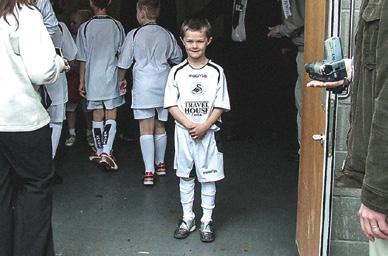
I was offered trials at Swansea and Cardiff, and my father never even had to ask. It was only ever going to be Swansea. Once I signed it was serious for me.
From there it was all focus on football. My parents did make sure I did work hard at school, and it did not suffer because of football.
I did well in school and got good grades, but everything else was football. People would laugh at me when I said I wanted to be a footballer. They did not think I was serious, but I was and so were my family. I used to go and watch games and I would tell my parents: “I am going to play on that pitch one day”.
You visit your old school quite regularly, and there’s a few kids running round there with their Liam Cullen shirts on.
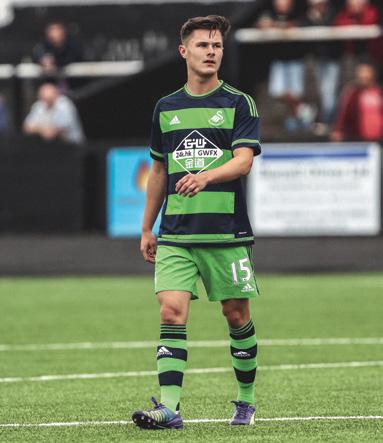
The teachers at my primary school were always supportive. If I had to go to training or whatever, they let me go but always made sure I caught up with everything I needed.
There were days when I was in secondary school at Greenhill where I would leave at midday, after just one or two lessons. They made sure I had all my core subjects nailed down, but there were some days where I was there all day, or I would not be in at all.
My sister Jodie also used to work at my old primary school, so I used to go back and they’ve got a couple of my shirts on the wall there.
I donate quite a bit of my kit to them. One of my mum’s best friends work there and I like to give something back. They are so supportive, it’s a real close community and it’s really nice to get back there and see everyone.
How difficult was it to balance school and football?
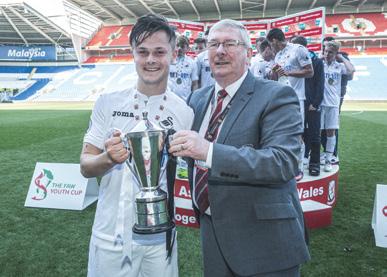
It wasn’t easy. Especially once I was a bit older and the boys in the academy would be reporting at 1pm to train. When I was 15, I moved into digs. I can remember coming home one night and my parents said they had something to ask me, and I knew they would be asking me if I was ready to move out.
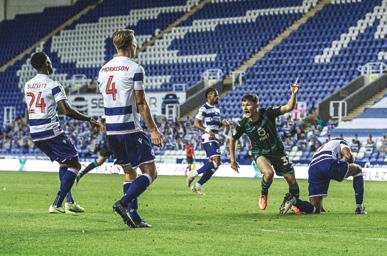
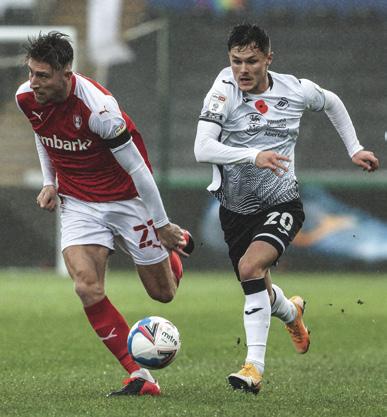

It must have been a big adjustment to leave home for the first time at such a young age?
Myself and Dan (Jefferies) were the first kids to do it from such a young age. We moved to school here, and the host family we lived with were wonderful to us.
Mark and Fran Rees were unbelievable, especially with us being so young. I think without such a good housemate and family it would have been very difficult. They told us to treat the house as our own and that we were part of the family.
I lived there for a year, left for three or four months and then moved in with Mark’s sister and her husband, Maggie and Mike Monks. They are like my second family, I speak to their son and daughter on a regular basis.
I was fortunate to find such great people, and I know that if I ever needed anything down here with my parents living a bit further away, I could rely on them.
For example, when I bought my first house and I was waiting for it to go through, I moved back in with Mike and Maggie. They were really good to me.
How did things progress for you on the pitch during this period? You were tipped for first-team action from a very young age.
When I was 14 or 15 there was a little bit of talk about me, but I never took much notice. I only ever used it as motivation to try and show the people who thought well of me were right.
I think a lot of that comes from my family, they would never let anything like that go to my head. I am not that kind of person, anyway, it was only ever about focusing on playing well and enjoying what I was doing. It was nice to be well thought of, but I knew it would not matter if I did not make the most of the opportunity.
The bigger thing was making sure that people like Tony Pennock – who was the academy manager who signed me – and the coaches I worked with thought I was doing well and doing my best.
He was a big influence, but there were people like Jon Grey, Chris Llewellyn, Anthony Wright, Cameron Toshack, Gary Richards who were also big influences on me.
I could name many more too, I owe it to everyone who has ever played a role in my career. I’m so grateful to them.
Your first-team breakthrough this year came on the back of some outstanding form for the under-23s, where you scored 17 goals in 23 games. A few of those were in the form of fantastic free-kicks, and I understand you’ve taken inspiration from a former Swan on that front?
At the start of the season, I wanted to focus on being good at free-kicks because it adds goals to your game.
I practiced a lot through pre-season and at the start of the campaign with Shaun Baggridge.
I had a lot of conversations with him about how I practiced them.
He was telling me about how he used to help Gylfi when he was at Swansea.
Gylfi used to place 10 balls at four different points around the penalty area and the same distance from the goal. He’d set the wall up how he thought the goalkeeper would and hit 10 from each position every day after training.
Obviously, you see how good he is at taking setpieces, so I started adapting that practice technique in terms of how much I did.
Seeing the free-kick go in against a quality team like Porto after the practice I’d put into that specific technique made it one of my more pleasing goals.
It’s a good technique to have in your game. Even if it’s just one or two goals, it all adds to your tally.
You have spoken of your love of playing cricket for Kilgetty, is it true that you help out behind the bar and in keeping the grounds in shape during the summers?
Yeah, I’ve done a few shifts behind the bar if my mum and dad need a hand. Again, it’s just something normal and I like the social aspect of catching up with people and seeing how they are. So I enjoy pulling the odd pint when I get a chance.
I do help out with the grounds too, I’m a bit of a handyman when I’m down there to be honest.
My grandfather does the grounds a lot, so I help him with that. He’s done it for years, and during lockdown they were making some improvements and helped out.
I don’t get to spend much time with my family, so when I can I want to make the most of it. They are the most important thing to me. Always have been. I drop everything else to get back and see them when I can.
It’s great, I go back and everything just clicks back into place. It’s the same with my girlfriend, we all just fit together so well.
It’s been a big year for you with regular first-team involvement, and you got your first Swansea goal on a night that will probably never be forgotten by supporters. What was that moment like?
It was a great night. I was in the squad and when the gaffer told me to get ready I knew I had to get myself in the box and try and get onto anything.
I knew the situation by the time I came on, we had not heard much in the first half, but as the second half went on we were getting the info.
When that ball fell in the box, I knew I needed to get to it. It was instinctive, I knew I had to slide and get a good contact. I could not really have thought of too many better ways to get a first goal.
I will never forget it, to score a goal that helped us get in the play-offs was so special. The only thing missing was the fans, and being able to properly share it with them.
You’ve made your first start recently, which is obviously a big milestone for a player. But I’m guessing the goal is to make sure there’s many, many more to come?
The attitude at this club is that you always want to press on. I always wanted to play for the first team, but starting one game is not the be-all and endall. I want to play 30, 40, 50, even 100 games like guys like Connor (Roberts), Matt (Grimes) and Jay (Fulton) have done recently.
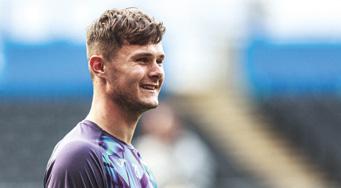
JACK THE LAD
If there was anyone daft enough to have any doubts over Andre Ayew’s commitment to the Swans, there was an incident in the closing seconds of the first half at Forest that would have completely obliterated them.
The Ghanaian was challenging for possession deep in the opposition half, down near the corner flag, when the ball went out of play for a throw in.
When the linesman gave the decision to Forest, Ayew threw himself to the ground in utter fury and frustration.
Now, as a father of two, I would have frowned at similar behaviour from my children, telling them such tantrums were not on.
But the explosion of emotion is exactly what I want to see from Swans players - as long as they don’t go over the top and get themselves booked!
It was yet another indication of Ayew’s total commitment to the Swans’ cause.
The ball couldn’t have been further from the Swans goal, literally with seconds left until the interval, but Ayew wanted that possession and felt hugely hard done by when he didn’t get it.
There was a time after the Swans had been relegated from the Premier League when some questioned whether a player, who obviously has the talent to play at a higher level, would “put a shift in” if he stayed at the club.
Put a shift in? Ayew does “doublers” every time he pulls on a Swans shirt.
Such a talented player could probably depend on his sheer footballing talent and intelligence in order to shine. But Ayew doesn’t just give you the skills, he gives you the sweat as well.
He may not wear the captain’s armband on a regular basis, but Ayew is one of the team’s genuine leaders - leading by example with his excellence, enthusiasm and effort.

Those qualities were in evidence once again in the dying seconds of the match as the Swans defended a corner.
Ayew could be seen back on his own goal-line clapping his hands, urging his team-mates to keep up their concentration as Forest pressed hard for an equaliser.
Ayew is clearly appreciated by the manager as well as us fans.
It is an open secret that, by Championship standards, the 30-year-old is handsomely rewarded for is efforts, but Steve Cooper is adamant his frontrunner is worth every penny. In the run up to the Forest match, Cooper was asked whether Ayew provided value for money. The manager replied: “I’ve always felt that.
“I’ve said it many times, he’s an outstanding player and professional and a good person, too.
“He’s motivated to do well, but he had a setback getting injured on international duty. The Championship is full of really good players and Andre is up there with the best of them. He has been fantastic for us.”
Ayew lived up to his manager’s deserved praise, with yet another superb performance against Forest.
But it is important to point out the forward wasn’t the only one showing outstanding commitment at Forest.
Someone born much closer to the Liberty Stadium had illustrated those standards a few minutes before Ayew’s corner flag complaints during the first half at the City Ground.
As Ayew’s deflected cross looped seemingly harmlessly in the general direction of Connor Roberts in the 43rd minute, there seemed to be little danger to the Forest goal.
The Welsh international looked very much second favourite to Forest’s lanky Sammy Ameobi, who appeared to be in a far better position to head the ball than Roberts.
But the 5ft 9in man produced a prodigious Ronaldo-like leap to rise above the 6ft 4in Ameobi to head home the winner.
Not only did Roberts comprehensively out jump Ameobi when the odds appeared stacked against him, he headed the ball powerfully downwards towards goal with the knowledge his head was likely to clash with his opponent’s.
Despite the thudding collision of skull on skull, I loved the fact that the prone Roberts managed a mini fist-clenched celebration before the pain in his head started to kick in! Roberts’ desire to win that header also brought praise from the manager. “I thought Connor’s goal epitomised the performance today,” he said.

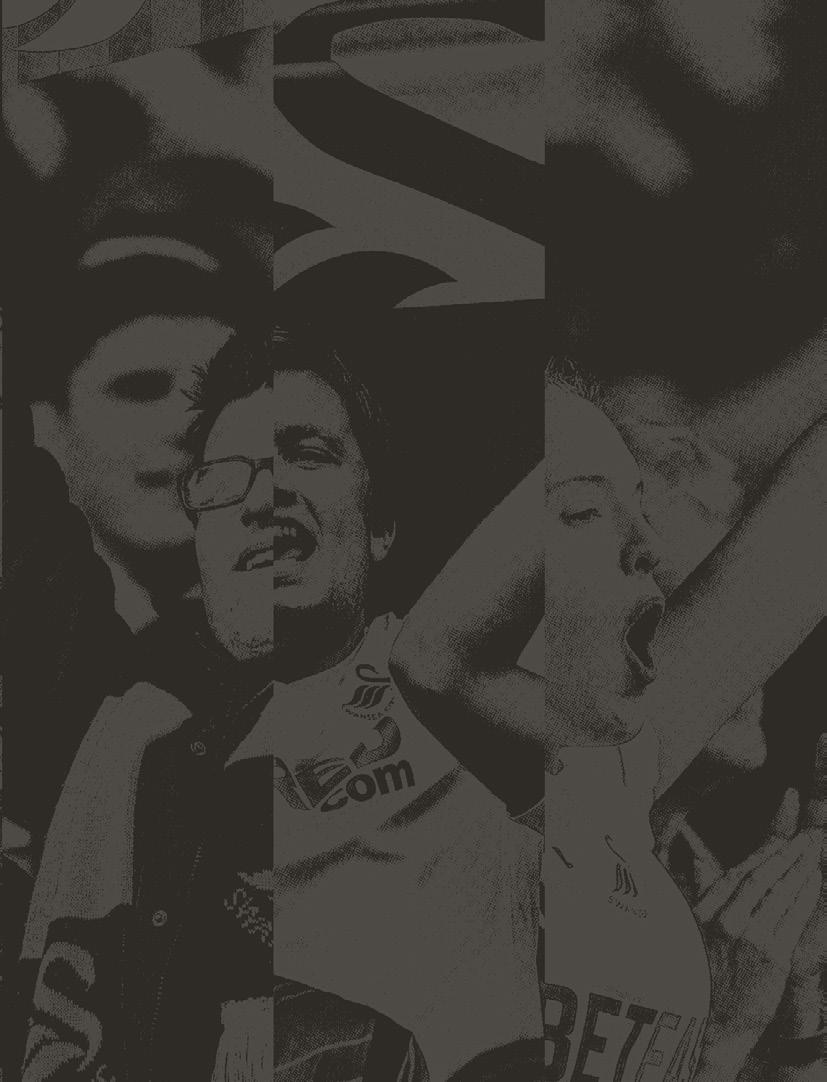
“Our wing-back was in the opposition box jumping over a 6ft 4in player, banging his face and heading the ball into the goal.
“I’m not surprised because that’s Connor. I thought that was a really good example of our mentality today. He showed it there, but I thought everybody was the same.”
And that is surely the most heartwarming feature of the current squad as far as Swans fans are concerned.
Whether it is the hugely experienced captain of Ghana, or a young Welsh international born a handful of miles from the Liberty Stadium, this current Swans side is showing commitment and desire by the bucketload from one to 11.
I know 100 per cent effort is the very least us fans demand from the players every week, but it’s hugely satisfying when you see such obvious displays of commitment to the club’s cause.
Whether it’s Ayew losing his rag over a seemingly inconsequential throw in, or Roberts apparently defying gravity to head home a winner, it’s exactly what we want to see.
Win or lose, we can ask no more. But, with that kind of desire, I’m sure we’re going to carry on winning more than we lose.
C’mon you Swans!
SWANS ACADEMY BY NIGEL REES
Good afternoon Everybody/Prynhawn Da Pawb. It’s been a very busy few weeks for the Academy with all age groups from under-9 to under-16 now fully operational. We are looking to begin our fixture schedule with our players now at a level of fitness which will allow them to participate in a structured games programme. We are still encountering some disruption with the COVID scenario, but it is a pleasure to have our boys back training and playing.
The under 23-squad recently travelled to QPR in the league programme. The lads narrowly lost the game but continue to develop under the leadership of Jon Grey and Martin Davies. Both staff are very experienced in the development of young players and provide a great learning opportunity and platform for the boys to make their transition into senior football.
The under-18 squad continue to work hard. For many of this squad it will be the first time that they have lived away from home and we are always mindful of helping each player with this big transition. Unlike in previous seasons, we have significant numbers of under-18 players involved not only in the under-23 squad, but also in the matchday starting XI. The squad is led by Anthony Wright and Darran Jones who work tirelessly with the group, and are very experienced in the development of young players.
The Academy continued to invest in its athletic development department over the last year to ensure that we can expose our players to the best possible development programme. We will shortly be in the process of undergoing our scheduled National Benchmark Fitness Testing series of agespecific physical performance tests for all players from under-9 to under-23. The Premier League provides all clubs with standardised equipment whilst strict protocols ensure the facilities and tests are valid, reliable and repeatable. The fitness data is recorded, which in turn allows the Premier League to benchmark the athletic development of all academy players. This provides each club with the ability to benchmark the physical profile of each player against biological (bio-banded), chronological and positional standards across the whole academy system. With these tests and processes in place it is possible that all academies can observe their players’ individual growth and maturation status and development, to help provide specific and tailored training programs for all our players.
I would like to take this opportunity to thank Steve Cooper and all his staff for giving the Academy players such an excellent opportunity within the first-team environment. The patience and support shown by the head coach is evident with the players growing in confidence and ability. Steve has given the boys a chance and shown that there is a very clear pathway into the first-team environment. All our players are aware that if they perform well and work hard there will be an opportunity within the first-team structure. The communication between the first team and academy is the best it has been since my time at the club. This is paramount to the development of the players and is shown by the number of academy graduates who have made the step up. There is regular dialogue with staff and this process continues to grow and develop with our players always at the heart of the discussions.
As an Academy, our primary function is producing elite players for our first team, but we also focus on our players that don’t end up with professional careers. We encourage all our youngsters to devote so much time and effort towards football that we take responsibility for players futures, whether they succeed in football or not, very seriously. We try and support all our players through this very difficult period, but the reality is that only a small percentage of players will graduate to senior level. We work with players to look at appropriate pathways into other levels of football or into alternative careers if desired. This is why our education programme is an integral part of our Academy structure and we are constantly reviewing our education provision to ensure we are supporting our players in the best way possible.
Enjoy the game this afternoon.


